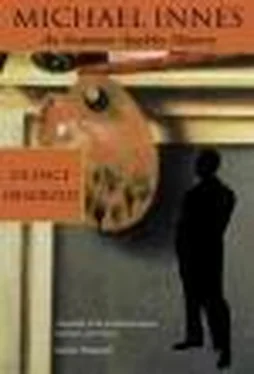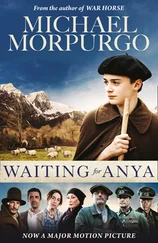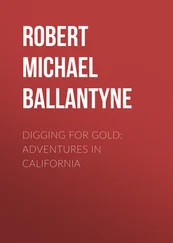Michael Innes - Lament for a Maker
Здесь есть возможность читать онлайн «Michael Innes - Lament for a Maker» весь текст электронной книги совершенно бесплатно (целиком полную версию без сокращений). В некоторых случаях можно слушать аудио, скачать через торрент в формате fb2 и присутствует краткое содержание. Жанр: Старинная литература, на английском языке. Описание произведения, (предисловие) а так же отзывы посетителей доступны на портале библиотеки ЛибКат.
- Название:Lament for a Maker
- Автор:
- Жанр:
- Год:неизвестен
- ISBN:нет данных
- Рейтинг книги:4 / 5. Голосов: 1
-
Избранное:Добавить в избранное
- Отзывы:
-
Ваша оценка:
- 80
- 1
- 2
- 3
- 4
- 5
Lament for a Maker: краткое содержание, описание и аннотация
Предлагаем к чтению аннотацию, описание, краткое содержание или предисловие (зависит от того, что написал сам автор книги «Lament for a Maker»). Если вы не нашли необходимую информацию о книге — напишите в комментариях, мы постараемся отыскать её.
Lament for a Maker — читать онлайн бесплатно полную книгу (весь текст) целиком
Ниже представлен текст книги, разбитый по страницам. Система сохранения места последней прочитанной страницы, позволяет с удобством читать онлайн бесплатно книгу «Lament for a Maker», без необходимости каждый раз заново искать на чём Вы остановились. Поставьте закладку, и сможете в любой момент перейти на страницу, на которой закончили чтение.
Интервал:
Закладка:
I turned to Sybil. ‘Where is Guthrie?’
For a fraction of a second she hesitated, looking warily but composedly from one to the other of us. Then quietly, a little unsteadily, she said. ‘He has fallen from the tower.’ And as if in explanation she pointed across the room to a door close to the one by which we had entered.
I took Hardcastle’s lantern from him and explored. What I found was a small, narrow bedroom, with the same narrow slits for windows as in the staircase, and with a second stout door, now swinging open upon blackness, almost directly opposite the door in which I stood. I crossed the little bedroom to this further door and looked out. I had to clutch at the jamb as I did so, for the wind – though I believe it was moderating steadily – was terrific up here. Before me was a narrow platform of much-trodden snow, bounded by a low castellated parapet – the original battlements, I suppose, of the keep. I staggered cautiously to the verge and looked down. There was nothing to be seen but blackness, and nothing to be heard but the whip and sigh of the wind. I remembered the length of the climb I had just made up the tower staircase and knew that, however thick the blanket of snow beneath, the man who had gone over the parapet was now dead. My first thought – it shows how curiously practical one turns in a crisis – was of relief that there would be no agonised need of medical aid. My second and related thought was that we were most awkwardly isolated should it prove to be some deep mischief that was afoot. And my third thought was simply an image of the rascal Hardcastle, for in my mind already mischief and that ugly brute went together.
I turned back into the study doing my best to think fast. One thing was clear to me on a moment’s reflection. Ranald Guthrie, unless drunk or really demented or walking in sleep or trance, was most unlikely to have taken that drop by sheer accident. It was with a shock that I remembered Sybil’s flat words: ‘He has fallen from the tower.’ They implied – taken in strictness they positively stated – that the merest misadventure was in question. And suddenly I saw the full implications of such a violent and mysterious affair as this, and of the atmosphere in which I had been living these thirty hours past. Suspense, fear, black humours, learned rats, violent death: the sum of them gave one unescapable answer – suspicion. Erchany as the exclusive territory of a malign enchanter was a fantasy of the past; what had happened in the tower tonight made it the territory too of coroners and plain-clothes policemen. And ten miles away over formidable snows there was no doubt a rural constable; twenty miles away a sergeant; and in Aberdeen or Edinburgh perhaps the sort of officer who would deal efficiently with such a matter as this. I must have looked from Sybil to Hardcastle and from Hardcastle to Sybil with an expression of positively virgin responsibility.
Guthrie was undoubtedly dead: nevertheless common humanity dictated that our first real effort should be to reach his body. If, however, we were on the scene of the crime I felt that neither Sybil – whose presence in the tower was unexplained – nor the sinister Hardcastle had better be left in sole possession of it. Sybil could be sent to Christine – only the task of telling Christine what had happened I ought to perform myself, and it must wait until I had been outside and made sure. At the moment, therefore, the three of us in the tower had better stick together.
During these researches into the etiquette of violence I was looking around. I think you had better have the lie of the land as I made it out now and later.
This top storey of the tower is set back from the storeys below, and is in consequence completely islanded by a narrow battlemented platform – a parapet walk – from which there is a sheer drop to the house and the moat beneath. There are two staircases: one is a little spiral staircase that emerges through a trapdoor upon a corner of the open parapet walk; the other is the staircase by which I had come, and which opens within the topmost storey and directly upon the study. From the study one door gives upon the parapet walk and one upon the little bedroom – from which in turn another door gives upon the parapet walk. All the windows are of the narrow defensive sort.
I decided that if possible I ought to lock up. So I took Hardcastle’s lantern again and went to explore the spiral staircase, as also the state of the snow on the platform. It was my impression that there was evidence of a good deal of coming and going about that wind-swept ribbon of battlement, but already the marks were everywhere indistinct and it would have been waste of time trying to direct on them the eye of an amateur detective. I noted the mere fact that recently, within, say, the last half-hour – there had been something like commotion on this hazardous spot; then I went on to the trapdoor. And here the snow was disturbed in a way that afforded definite evidence; recently, the trapdoor had been open. A tug at a stout iron ring told me the door was now bolted from below; a moment’s fumbling found me what I wanted, a bolt that could be pushed home from above. It moved easily; one entrance to the tower-top was secured.
I moved back as quickly as was prudent, pausing only for a glance at the sky. The moon was behind a rack of clouds, but here and there was a star or a group of stars: what must have been Orion’s belt appeared as suddenly as a line of streetlights while I looked. I guessed that daylight would see the snow stretched beneath a clear sky and that for the time being the last flakes had fallen.
I returned to the study and found Sybil and Hardcastle standing very much as I had left them. I said: ‘Now we’ll go downstairs.’ We trooped out to the little landing and I locked the door and put the key in my pocket. Study, bedroom and battlements were inaccessible. Hardcastle muttered something indistinguishable – perhaps it was an attempt to vindicate his stewardship of Erchany – but I was already leading the way down at a run. When we got to ground level Hardcastle indicated another and smaller stair. I locked a further door giving access to the tower staircase and we went down further to a sort of basement. From the tower-top, I realized, Guthrie must have fallen clean into the moat. It was when we came to a little door giving on this that Sybil spoke for the first time since she had said ‘He has fallen from the tower.’ What she said now was: ‘I’m coming too.’ And she produced her torch and switched it on with an air of such determination that I knew expostulation would be useless.
In the moat the snow was deep and so powder-soft that I wondered for a moment against my better knowledge whether Guthrie might not have survived. Our feet sank down to the knee as we rounded an angle of the tower, Hardcastle’s lantern making a wavering circle of light around us and Sybil’s torch exploring the moat in front. A moment later we saw ahead the expected dark splash on the snow. We hurried forward. My heart leapt. The dark splash had stirred.
There was a wild cry – Hardcastle’s. I glanced at him; the sweat was pouring down his face in that icy ditch; he had completely lost his nerve. My glance returned to the vague bulk in front and I realised that what had moved was the figure of a man, crouched over the body. The figure straightened itself as we came up. A voice said: ‘He’s dead.’
When I wrote that Guthrie’s end had been horrible I was thinking chiefly of the full, frank satisfaction in the deep Scottish voice which spoke these words. Dead men hear no curses and mundane mire and fury is nothing to a ghost; still I hope that none will sound that note in my requiem. I said as sternly as if I had been owner of Erchany and chief constable of the county in one: ‘Who are you and what are you doing here?’
Читать дальшеИнтервал:
Закладка:
Похожие книги на «Lament for a Maker»
Представляем Вашему вниманию похожие книги на «Lament for a Maker» списком для выбора. Мы отобрали схожую по названию и смыслу литературу в надежде предоставить читателям больше вариантов отыскать новые, интересные, ещё непрочитанные произведения.
Обсуждение, отзывы о книге «Lament for a Maker» и просто собственные мнения читателей. Оставьте ваши комментарии, напишите, что Вы думаете о произведении, его смысле или главных героях. Укажите что конкретно понравилось, а что нет, и почему Вы так считаете.











